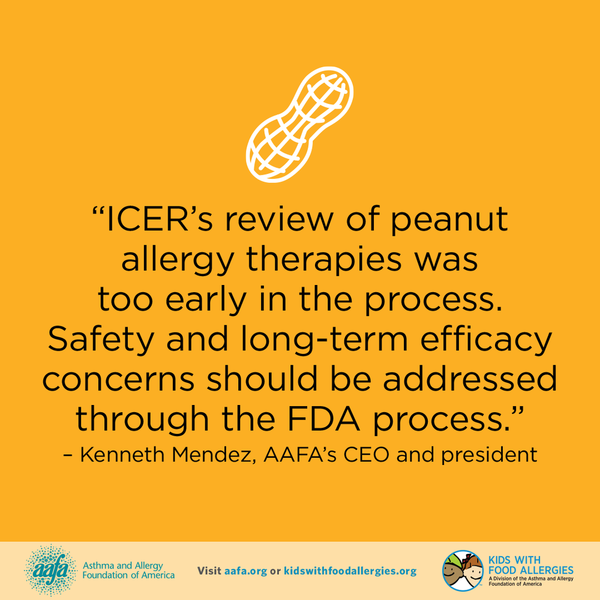The Asthma and Allergy Foundation of America (AAFA) addresses concerns regarding the Final Evidence Report assessing the clinical effectiveness and value of treatments for peanut allergy released by the Institute for Clinical and Economic Review (ICER) on July 10, 2019.
released by the Institute for Clinical and Economic Review (ICER) on July 10, 2019.
ICER’s report may cause concern for the allergy community that the findings will restrict access to new treatments for peanut allergy. The review examined two new technologies to induce immune tolerance to peanut — Viaskin® Peanut (DBV Technologies) and AR101 (Aimmune Therapeutics) — as well as non-commercialized oral immunotherapy (OIT).
ICER’s evaluation does not impact an approval nor denial from the Food and Drug Administration (FDA). “ICER’s review of these therapies was too early in the process,” stated Kenneth Mendez, AAFA’s CEO and president. “Safety and long-term efficacy concerns should be addressed through the FDA review process. If promising treatments are approved by the FDA, then as with any treatment, patients and their health care providers should decide which treatment is appropriate.”

If these immunotherapy treatments are approved by the FDA, then patients and caregivers must work with their doctors to understand the benefits and risks to determine if the treatments are right for them. While there is inherent risk for undergoing desensitization that patients with allergies must consider, there could be significant benefits in quality of life from these treatments. These therapies intentionally expose patients to small doses of allergens over time so a person’s immune system can build up a tolerance to the allergen. “In many ways, this is like bee venom immunotherapy (allergy shots). People who have life-threatening reactions to bee stings may choose the discomfort of desensitization to prevent future serious reactions.” Mendez stated. “These peanut therapies open up a similar option for those who have life-threatening peanut allergies.”
ICER’s own economic model calculates between a 30-70% positive improvement in ICER’s quality of life measure from these therapies when considering the societal costs associated with peanut allergies. This improvement demonstrates the importance and opportunity for development of new therapies to address all food allergies, not just peanut allergies. It will be good news for patients if more of these kinds of therapies are developed.
AAFA agrees with ICER that we need more long-term data to focus on outcomes important to patients. AAFA advocates for considering quality of life for caregivers when evaluating childhood food allergy burden and outcomes. AAFA’s My Life With Food Allergy study cited in ICER’s Final Evidence Report finds notable negative mental health impact on caregivers of children with peanut allergy.
AAFA has long recognized the need for greater health literacy and support to improve patient/family understanding on how to manage allergic conditions and to learn about potential therapies. The first-of-its-kind Kids With Food Allergies community is the largest online support community for food allergies. It offers practical, evidence-based education to help parents understand food allergies. Registration is free at www.kidswithfoodallergies.org/join.
About AAFA
Founded in 1953, AAFA is the oldest and largest non-profit patient organization dedicated to saving lives and reducing the burden of disease for people with asthma, allergies and related conditions through research, education, advocacy and support. AAFA provides practical information and community-based services. Through its Kids With Food Allergies division, AAFA offers the most extensive online support community for families raising children with food allergies. For more information, visit www.aafa.org.


Comments (0)